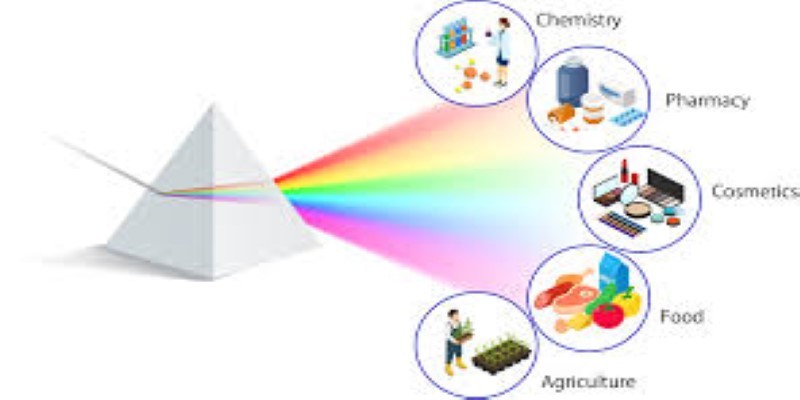
About Course
Fundamentals of Spectroscopy.
Spectroscopy is the study of the interaction of light (electromagnetic radiation) with matter. Electromagnetic radiation covers a wide range of frequencies from gamma rays to radio frequencies. Depending on the frequency of radiation interacting with the matter, one can have different forms of spectroscopy.
These spectroscopic techniques allow us to monitor the structural properties of matter. For example, information on the moment of inertia (and hence bond length) can be obtained from the rotational spectrum. Similarly, the vibrational spectrum provides information on the force constant, i.e.
the strength of a chemical bond. Besides providing information on molecular structure, spectroscopic techniques can also be used for quantitative estimation of a substance making spectroscopy an important analytical tool. Further, a spectroscopic transition is characterized by a definite timescale and this can provide information on molecular dynamics. In this course, the fundamental principles of the different forms of spectroscopy will be elaborated in a unified way from both theoretical and experimental viewpoints.
The application of these different spectroscopic methods for the elucidation of molecular structure will also be discussed. The structural and dynamic aspects of spectroscopic are fundamental to physics, chemistry, and biology. Thus, this course will provide a thorough conceptual understanding of these branches of science.
INTENDED AUDIENCE: Interested Learners
Course Content
Fundamentals of Spectroscopy
-
mod12lec61-Electronic Spectroscopy – 5
00:00 -
Resonance Spectroscopy – Introduction 1
00:00 -
Polarization Effects and Numericals
00:00 -
Vibrational Raman Spectroscopy
00:00 -
Raman Activity of Vibrations
00:00 -
Polarizability and Polarizability Ellipsoid
00:00 -
Nuclear Spin Statistics
00:00 -
Rotational Raman Spectroscopy
00:00 -
Quantum theory of Raman effect
00:00 -
Introduction to Raman Spectroscopy
00:00 -
Normal Mode Coordinates
00:00 -
Vibration of Polyatomic Molecules III
00:00 -
Vibration of Polyatomic Molecules III
00:00 -
Vibration of Polyatomic Molecules II
00:00 -
Resonance Spectroscopy – Introduction 2
00:00 -
mod10lec47-NMR Spectroscopy – 1
00:00 -
mod12lec60-Electronic Spectroscopy – 4
00:00 -
mod12lec59-Electronic Spectroscopy – 3
00:00 -
mod12lec58-Electronic Spectroscopy – 2
00:00 -
mod12lec57-Electronic Spectroscopy – 1
00:00 -
mod11lec56-ESR Spectroscopy – 4
00:00 -
mod11lec55-ESR Spectroscopy – 3
00:00 -
mod11lec54-ESR Spectroscopy – 2
00:00 -
mod11lec53-ESR Spectroscopy – 1
00:00 -
mod11lec52-NMR Spectroscopy – 6
00:00 -
mod10lec51-NMR Spectroscopy – 5
00:00 -
mod10lec50-NMR Spectroscopy – 4
00:00 -
mod10lec49-NMR Spectroscopy – 3
00:00 -
mod10lec48-NMR Spectroscopy – 2
00:00 -
Vibration of Polyatomic Molecules I
00:00 -
Ro-vibrational Spectrum – III
00:00 -
Vibration of a Diatomic Molecule and Derivation of the Vibrational Selection Rule
00:00 -
Selection Rules & Rotational Spectrum
00:00 -
Diatomic Rigid Rotor
00:00 -
Correspondence between Linear Motion and Rotational Motion
00:00 -
Spectroscopic Timescales
00:00 -
Different Forms of Spectroscopy
00:00 -
Lineshape Analysis
00:00 -
Comparision between Chemical Reactions and Spectroscopic Transitions
00:00 -
Intensity of a Transtion Depends on the Transition Dipole Moment – II
00:00 -
Intensity of a Transtion Depends on the Transition Dipole Moment – I
00:00 -
Spectroscopic Transitions
00:00 -
A Simple Quantum Mechanical System: Particle in a one Dimensional Box
00:00 -
Introduction to Quantum Mechanics – II
00:00 -
Introduction to Quantum Mechanics – I
00:00 -
Isotope effect
00:00 -
Degeneracy
00:00 -
Harmonic Oscillator Eigenvalues and Eigenfunctions – II
00:00 -
Harmonic Oscillator Eigenvalues and Eigenfunctions – I
00:00 -
Ro-vibrational Spectrum – II
00:00 -
Ro-vibrational Spectrum – I
00:00 -
Effects of Anharmonicity
00:00 -
Anharmonicity
00:00 -
Selection Rules
00:00 -
Energy Levels
00:00 -
Simple Harmonic Oscillator
00:00 -
Origin of the Rotational Selection Rule
00:00 -
Polyatomic Molecules II and Numericals
00:00 -
Polyatomic Molecules I
00:00 -
Non Rigid Rotor
00:00 -
Introduction to Spectroscopy
00:00
Student Ratings & Reviews

